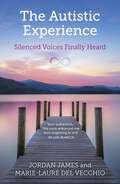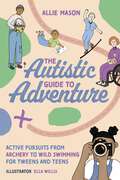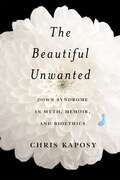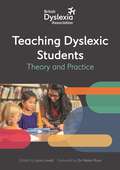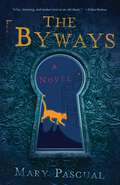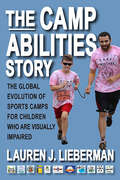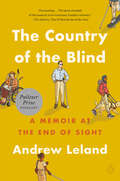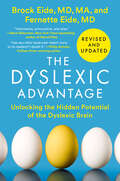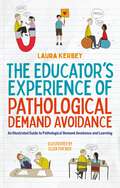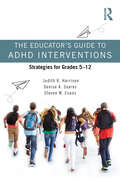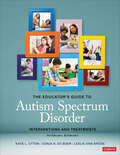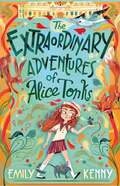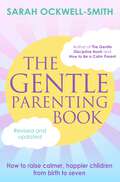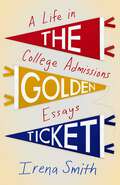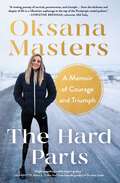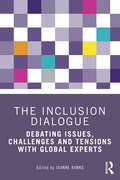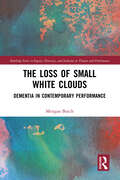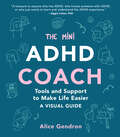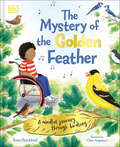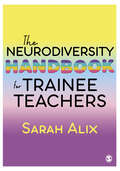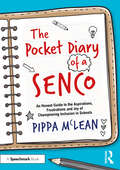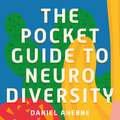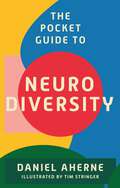- Table View
- List View
The Autistic Experience: Silenced Voices Finally Heard
by Marie-Laure Del Vecchio Joe James'My autism and ADHD are as integral to me as my sense of personal ethics' Lettie 'That clearly visible line for everyone else was non-existent for me, and often I was ridiculed' Parnel 'Questioning authority? I was seeking clarification!' Loukas 'I hate eye contact but I do it in order to look normal' DianaThese are Autistic Voices, and this is The Autistic Experience. Curated by psychologist and psychotherapist Marie-Laure Del Vecchio, and the Autistic Photographer, Joe James, whose own experience of trauma drives his mission to create an inclusive society. This book is a brave, unflinching and ultimately optimistic collection of stories about life in the lens of autism. Sometimes sad, sometimes funny, often shocking and always eye-opening, these stories from people across the globe explore all aspects of autistic life - from the earliest childhood memories to the challenges facing the autistic parent or grandparent. From school days to office life, from teenagers to those in their seventies, across all genders, from people who are homeless to NASA scientists, The Autistic Experience explodes the myths around autism and celebrates the right to be autistic.Taking a deep dive into controversies like the 'causes' of autism this is, above all, a book that speaks to the hundreds of thousands of people both with and without an autism diagnosis who need to know that to live in a more inclusive, adjusted and autism-friendly environment is a right worth fighting for.
The Autistic Experience: Silenced Voices Finally Heard
by Marie-Laure Del Vecchio Joe James'My autism and ADHD are as integral to me as my sense of personal ethics' Lettie 'That clearly visible line for everyone else was non-existent for me, and often I was ridiculed' Parnel 'Questioning authority? I was seeking clarification!' Loukas 'I hate eye contact but I do it in order to look normal' DianaThese are Autistic Voices, and this is The Autistic Experience. Curated by psychologist and psychotherapist Marie-Laure Del Vecchio, and the Autistic Photographer, Joe James, whose own experience of trauma drives his mission to create an inclusive society. This book is a brave, unflinching and ultimately optimistic collection of stories about life in the lens of autism. Sometimes sad, sometimes funny, often shocking and always eye-opening, these stories from people across the globe explore all aspects of autistic life - from the earliest childhood memories to the challenges facing the autistic parent or grandparent. From school days to office life, from teenagers to those in their seventies, across all genders, from people who are homeless to NASA scientists, The Autistic Experience explodes the myths around autism and celebrates the right to be autistic.Taking a deep dive into controversies like the 'causes' of autism this is, above all, a book that speaks to the hundreds of thousands of people both with and without an autism diagnosis who need to know that to live in a more inclusive, adjusted and autism-friendly environment is a right worth fighting for.
The Autistic Guide to Adventure: Active Pursuits from Archery to Wild Swimming for Tweens and Teens
by Allie MasonIt's time for a new generation of autistic adventurers!Outdoor adventuring can be life changing - it makes you physically and mentally stronger, takes you to new places and introduces you to new friends, as well as being an exhilarating challenge - but it can be stressful when there are unexpected social and sensory challenges involved. Allie Mason, autistic adventurer extraordinaire, is here to help. Join Allie as she introduces activities ranging from archery to stargazing, sailing to fossil hunting, snorkeling to nature-writing - and so much more. Each easily digestible factsheet comes with a short introduction, a summary of the sensory experiences involved, suggestions on approaching activities for when you're just getting started, as well as a handy budgeting system. With personal anecdotes and interviews with awesome autistic athletes, this book will give you the support you need to take on the great outdoors.
The Beautiful Unwanted: Down Syndrome in Myth, Memoir, and Bioethics
by Chris KaposyPrenatal genetic testing has changed the circumstances under which parents choose what pregnancies to carry to term. Some have predicted that as a result of parents’ choices, people with Down syndrome will disappear from our communities in the near future. Chris Kaposy, a bioethicist who has a son with Down syndrome, reflects on parenting his son in the midst of this supposed disappearance.Writing from a pro-choice, disability-positive perspective, Kaposy presents some of the decades-old bioethical controversies involving children with Down syndrome, illustrating a prehistory of disappearance that has shaped current attitudes toward intellectual disability. Layered throughout this history are elements of Kaposy’s personal experience with his son and family. Transcending monograph and memoir, The Beautiful Unwanted draws creatively upon the past and the present, upon myth, history, science, and personal stories, to present the world of families that include children with Down syndrome from a series of uncommon perspectives. This account encompasses the changeling myths of Newfoundland, the “discovery” of Down syndrome by John Langdon Down and Jérôme Lejeune, and the twentieth-century experience of institutionalization, as well as recent advances in reproductive technology.We must recognize that we have some control over the future, Kaposy argues, and we must ask what kind of future we want for those who have intellectual disabilities. The Beautiful Unwanted poses this question in a way that is engaging, often bewildering, and always fascinating.
The British Dyslexia Association - Teaching Dyslexic Students: Theory and Practice
by British Dyslexia AssociationThis BDA developed guide assists you in supporting children and students with dyslexia and specific learning difficulties through their education. Designed specifically for candidates on Level 5 diploma courses in dyslexia and specific learning difficulties, this hands-on guide is the perfect training companion for those wanting to know more about dyslexia and how to support individuals with dyslexia.As an authoritative, entry-level resource covering both theory and practice, the methods, resources, and expert contributors in this book empower your learning as an educator towards better self-understanding, confidence and how to better support students in specialist and classroom settings.
The Byways: A Novel
by Mary PascualNeurodivergent high school student CeeCee Harper has a temper and a reputation for trouble. Angry at the rumors and afraid she’ll never fit in, she makes a wrong move—and lands in the byways, a world of alleys, magic, and forgotten people . . . some that aren’t even human. And if she doesn’t escape quickly, CeeCee learns, she’ll be trapped for good.Searching for a way out, she gets lost among monsters, drug pushers, the homeless, and political upheaval, and soon finds there are those who will stop at nothing to keep her from leaving. But the byways pull people in for a reason. CeeCee must figure out why she got stuck in the first place—before her loved ones are put in danger and she loses them forever.A dark retelling of Alice in Wonderland meets Neverwhere, this contemporary fantasy will enchant Neil Gaiman and Christina Henry fans
The Camp Abilities Story: The Global Evolution of Sports Camps for Children Who Are Visually Impaired (Excelsior Editions)
by Lauren J. LiebermanIn 1995, Lauren Lieberman was an assistant professor with a dream: to form an educational sports camp for children who are visually impaired. Beginning with a small grant, Lieberman built a local program that grew into a worldwide movement. The Camp Abilities model has now been replicated all over the United States and in ten other countries. The Camp Abilities Story relates Lieberman's journey—from her earliest experiences in sports, to her "aha moment" during college, to her Fulbright scholarship and starting Camp Abilities programs worldwide. With an inspirational yet honest view of how a dream to make a difference in the world was tempered by the reality of the hard work necessary to change lives, the lessons herein are applicable to anyone with a dream to make the world a better place.
The Country of the Blind: A Memoir at the End of Sight
by Andrew LelandFINALIST FOR THE PULITZER PRIZE Named one of the best books of the year by: THE NEW YORKER • THE WASHINGTON POST • THE ATLANTIC • NPR • PUBLISHERS WEEKLY • LITHUB"Fascinating...The great strength of this memoir is its voracious, humble curiosity." - The Atlantic, The 10 Best Books of the YearA witty, winning, and revelatory personal narrative of the author&’s transition from sightedness to blindness and his quest to learn about blindness as a rich culture all its own.We meet Andrew Leland as he&’s suspended in the liminal state of the soon-to-be blind: he&’s midway through his life with retinitis pigmentosa, a condition that ushers those who live with it from sightedness to blindness over years, even decades. He grew up with full vision, but starting in his teenage years, his sight began to degrade from the outside in. Soon— but without knowing exactly when—he will likely have no vision left.Full of apprehension but also dogged curiosity, Leland embarks on a sweeping exploration of the state of being that awaits him: not only the physical experience of blindness but also its language, politics, and customs. He negotiates his changing relationships with his wife and son, and with his own sense of self, as he moves from his mainstream, &“typical&” life to one with a disability. Part memoir, part historical and cultural investigation, The Country of the Blind represents Leland&’s determination not to merely survive this transition but to grow from it—to seek out and revel in that which makes blindness enlightening. Brimming with warmth and humor, it is an exhilarating tour of a new way of being.
The Dyslexic Advantage (Revised and Updated): Unlocking the Hidden Potential of the Dyslexic Brain
by Brock L. Eide Fernette F. EideAn updated edition of Drs. Brock and Fernette Eide's popular dyslexia book with a wealth of new material and improved dyslexic-friendly font. What if we viewed dyslexia as a learning and processing style rather than as a learning disorder? Drs. Brock and Fernette Eide use their impressive backgrounds in neurology and education to debunk the standard deficit-based approach to dyslexia. People typically define &“dyslexia&” as a reading and spelling disorder. But through published research studies, clinical observations, and interviews with dyslexic individuals, the Eides prove that these challenges are not dyslexia&’s main features but are instead trade-offs resulting from an entirely different pattern of brain organization and information processing that has powerful advantages. For example, dyslexic adults routinely outperform their non-dyslexic peers in studies on three-dimensional spatial reasoning and divergent creativity—one of the reasons why so many dyslexics are successful engineers. Approximately 20 percent of the U.S. population has dyslexia, and The Dyslexic Advantage shows how each one is predisposed to powerful skills called MIND strengths (Material, Interconnected, Narrative, and Dynamic Reasoning), leading them to possess incredible pattern detection, divergent thinking, episodic memory, problem solving, and prediction abilities. The revised and updated edition of The Dyslexic Advantage includes eighteen rich new profiles of remarkable individuals with dyslexia—such as several world-renowned scientists, a Pulitzer Prize–winning poet, a world-record-setting memory specialist, three MacArthur &“Genius&” Award winners, the technical advisor for the Jurassic Park movies, and many more. Meanwhile, the enormous advances in dyslexia research over the last ten years provide valuable new insights for educators, employers, parents, dyslexic adults, and anyone interested in neurodiversity and human cognition. Blending personal stories with hard science, The Dyslexic Advantage (Revised and Updated) provides empowering advice on how to identify, understand, nurture, and enjoy the strengths of the dyslexic mind.
The Educator’s Experience of Pathological Demand Avoidance: An Illustrated Guide to Pathological Demand Avoidance and Learning
by Laura KerbeyI realised EVERYTHING I was doing was wrong.I needed to learn.I needed to change.During Laura Kerbey's time teaching autistic children, she had a sudden realisation that those with Pathological Demand Avoidance (PDA) are children like no other! None of her tried and tested autism strategies would work to help them focus or learn and most of her time was spent wondering, what am I doing wrong?If you feel the same, this short, easy-to-read guide is here to teach you everything you need to know from one educator to another. With an introduction to what PDA is followed by PDA tailored advice on how to connect with your student and create an autonomous, spontaneous environment that is personalised for you both, this guide is here to ensure that you and your PDA student thrive!Illustrated by the popular Eliza Fricker and packed with entertaining anecdotes (including one about Jabba the Hut's poo), this go-to-guide contains everything you need to start implementing PDA friendly learning to help you connect with your student and help them make the most of their learning experience.
The Educator’s Guide to ADHD Interventions: Strategies for Grades 5-12
by Judith R. Harrison Steven W. Evans Denise A. SoaresDesigned specifically for middle and high school educators, this guidebook clearly and thoroughly breaks down effective classroom-based interventions for students with ADHD. Chapters walk readers through each intervention, providing step-by-step implementation guides, describing potential pitfalls and offering critical tips and advice to help you ensure that your interventions are both culturally responsive and sustainable. Filled with helpful templates and tools, this book is essential reading for anyone who needs help creating effective, sustainable interventions for students with ADHD.
The Educator′s Guide to Autism Spectrum Disorder: Interventions and Treatments
by Kaye L. Otten Sonja R. de Boer Leslie Ann BrossIdentify the best interventions to fit the unique needs of each learner with autism Whatever your role—general or special education teacher, school counselor, therapist, behavior analyst, administrator—you undoubtedly interact with learners with autism spectrum disorder (ASD) and are committed to helping them succeed and thrive. This easy-to-use accessible guide summarizes more than 75 interventions and rates each based on the most recent evidence of effectiveness and safety. Features include: A summary of interventions and treatments from a comprehensive variety of domains organized into 11 categories, including behavioral interventions, visual supports, social and emotional skills training, and physiological interventions, as well as interventions that have the potential for causing harm An evidence-based five-point scale that clearly rates each intervention’s effectiveness for specific learners Guidance for working with colleagues and families to choose and implement the most promising treatments Written by educators with decades of experience and expertise in a variety of settings, many of whom are also Board Certified Behavior Analysts, this comprehensive guide is an indispensable resource for all those who serve students with ASD.
The Educator′s Guide to Autism Spectrum Disorder: Interventions and Treatments
by Kaye L. Otten Sonja R. de Boer Leslie Ann BrossIdentify the best interventions to fit the unique needs of each learner with autism Whatever your role—general or special education teacher, school counselor, therapist, behavior analyst, administrator—you undoubtedly interact with learners with autism spectrum disorder (ASD) and are committed to helping them succeed and thrive. This easy-to-use accessible guide summarizes more than 75 interventions and rates each based on the most recent evidence of effectiveness and safety. Features include: A summary of interventions and treatments from a comprehensive variety of domains organized into 11 categories, including behavioral interventions, visual supports, social and emotional skills training, and physiological interventions, as well as interventions that have the potential for causing harm An evidence-based five-point scale that clearly rates each intervention’s effectiveness for specific learners Guidance for working with colleagues and families to choose and implement the most promising treatments Written by educators with decades of experience and expertise in a variety of settings, many of whom are also Board Certified Behavior Analysts, this comprehensive guide is an indispensable resource for all those who serve students with ASD.
The Extraordinary Adventures of Alice Tonks: Longlisted for the Adrien Prize, 2022 (The Extraordinary Adventures of Alice Tonks #1)
by Emily Kenny&“Has heart, soul and so much spirit.&” Lindsay Galvin, author of Darwin&’s Dragons &“Disappearing animals, twists and turns, and an amazing autistic protagonist.&” Rashmi Sirdeshpande, author of Dosh &“Exciting, deftly plotted and full of surprises.&” Sinéad O'Hart, author of The Eye of the North Alice Tonks would love to make friends at boarding school. And, being autistic, she just wants people to accept her for who she is. But after a rather strange encounter with a talking seagull on her first day, she suddenly has a new challenge and a lot of questions. Animals are going missing and Alice can&’t solve the mystery alone. With new friends behind her, can Alice harness her magic powers and become the hero she never imagined? A story about finding your voice, friendship and unlikely heroes, for fans of A Kind of Spark
The Gentle Parenting Book: How to raise calmer, happier children from birth to seven (Gentle #3)
by Sarah Ockwell-SmithParenting trends come and go. Gentle parenting is different - it isn't a label for a precise set of rules but a method of parenting that embraces the needs of parent and child, while being mindful of current science and child psychology. It means parenting with empathy, respect, understanding - and boundaries.In The Gentle Parenting Book, Sarah Ockwell-Smith provides a trustworthy combination of what-to-expect information and gentle-parenting solutions to the most common challenges faced by parents with young children. Sarah addresses a wide variety of topics, including coping with a crying baby, introducing solid foods and creating healthy eating habits, potty training, starting nursery and school, sibling rivalry, tantrums, whining and sulking, aggressive behaviour and much more.And for those parents who have previously used a more authoritarian style of parenting, there's plenty of advice - and reassurance - on making the transition to a gentler approach. For many, gentle parenting comes as a relief because it chimes with their deepest instincts about the best way to raise their children.
The Golden Ticket: A Life in College Admissions Essays
by Irena SmithWhat do we, as parents, really mean when we say we want the best for our children?Irena Smith tackles this question from a unique vantage point: as a former Stanford admissions officer, a private Palo Alto college counselor, and a mother of three children who struggle to find their place in the long shadow of Stanford University.Written as a series of responses to actual college essay prompts, this witty, raw memoir takes the reader from the smoke-filled lobby of the Hebrew Aid Society in Rome, where Irena and her parents await asylum with other Soviet refugees in 1977, to the overpriced house she and her husband buy in Palo Alto in 1999, to the hushed inner sanctum of the Stanford admissions office. Irena grows a successful college counseling practice but struggles to reconcile the lofty aspirations of tightly wound, competitive high school seniors (and their anxious parents) with her own attempts to keep her family from unraveling as, one by one, her children are diagnosed with autism, learning differences, depression, and anxiety. And although she doesn’t initially understand her children—or how to help them—she will not stop stumbling and learning until she figures it out. The Golden Ticket opens a much-needed conversation about extreme parenting, the weight of generational expectations, and what happens when Gen-X dreams meet unexpected realities. It's a sharp-eyed depiction of hard-won triumphs and of the messy, challenging parts of parenting you won't see on Facebook or Instagram. Above all, it's an invitation to embrace a broader, more generous definition of success.
The Hard Parts: A Memoir of Courage and Triumph
by Oksana Masters&“A gut-wrenching, wildly inspiring story about overcoming the most daunting obstacles through steely tenacity, sheer will, and a great big dose of motherly love.&” —Jeannette Walls, #1 New York Times bestselling author of The Glass Castle An inspirational and powerful memoir from the United States&’s most decorated winter Paralympic or Olympic athlete, The Hard Parts is Oksana Masters gripping account of overcoming extraordinary Chernobyl disaster–caused physical challenges to create a life that challenges everyone to push through what is holding them back.Oksana Masters was born in Ukraine—in the shadow of Chernobyl—seemingly with the odds stacked against her. She came into the world with one kidney, a partial stomach, six toes on each foot, webbed fingers, no right bicep, and no thumbs. Her left leg was six inches shorter than her right, and she was missing both tibias. Relinquished to the orphanage system by birth parents daunted by the staggering cost of what would be their child&’s medical care, Oksana encountered numerous abuses, some horrifying. Salvation came at age seven when Gay Masters, an unmarried American professor who saw a photo of the little girl and became haunted by her eyes, waged a two-year war against stubborn adoption authorities to rescue Oksana from her circumstances. In America, Oksana endured years of operations that included a double leg amputation. Still, how could she hope to fit in when there were so many things making her different? As it turned out, she would do much more than fit in. Determined to prove herself and fueled by a drive to succeed that still smoldered from childhood, Oksana triumphed in not just one sport but four—winning against the world&’s best in elite rowing, biathlon, cross-country skiing, and road cycling competitions. Now considered one of the world&’s top athletes, she is the recipient of seventeen Paralympic medals, the most of any US athlete of the Winter Games, Paralympic or Olympic. Oksana&’s astonishing story of journeying through a series of dark tunnels is &“as true a tale of grit as I&’ve ever heard, with a message filled with triumph and beauty—that what doesn&’t kill us makes us stronger, if we are loved&” (Angela Duckworth, New York Times bestselling author of Grit).
The Inclusion Dialogue: Debating Issues, Challenges and Tensions with Global Experts
by Joanne BanksThe Inclusion Dialogue: Debating Issues, Challenges and Tensions with Global Experts brings together a series of global expert views on inclusive education, revealing the evolving tensions in this research area and highlighting future directions. Based on fascinating and unique conversations with leading academic experts across the globe, Joanne Banks uses in-depth interviews to examine current debates in special and inclusive education and provides a clear overview of the key tensions which impact policy and practice across different national contexts. Her book also highlights how inclusive education policies do not always translate into inclusive practices in our schools. The dialogue presented in this accessible text provides readers with insights into our conceptual understanding of inclusion within the context of the United Nations Convention on the Rights of People with Disabilities. Through these informal discussions, this book is ideal for academics and researchers working in the area of inclusive and special education, for educators wishing to create more inclusive environments for their students, and for policy-makers seeking to understand what inclusive education looks like on the ground.
The Loss of Small White Clouds: Dementia in Contemporary Performance (Routledge Series in Equity, Diversity, and Inclusion in Theatre and Performance)
by Morgan BatchThis volume seeks to instigate a discussion about dementia in theatre. The discussions in this book borrow from the literature on dementia’s representation in other artforms, while reflecting on theatre’s unique capacity to incorporate multiple artforms in a live context (hypermediacy). The author examines constructions of diegesis and the use of various performance tools, including physical theatre, puppetry, and postdramatic performance. She discusses stage representations of interior experiences of dementia; selfhood in dementia; the demarcation of those with dementia from those without; endings, erasure, and the pursuit of catharsis; placelessness and disruptions of traditional dramatic constructions of time; and ultimately, performances creatively led by people with dementia. The book traces patterns of narrativisation on the stage—including common dramaturgical forms, settings, and character relationships—as well as examples that transcend mainstream representation. This book is important reading for theatre and performance students, scholars, and practitioners, as well as cultural studies writers engaged in research about narratives of dementia.
The Mini ADHD Coach: Tools and Support to Make Life Easier—A Visual Guide
by Alice GendronAn inclusive guide to ADHD that explores its diverse types, symptoms, diagnoses, and misconceptions, and shares how to work with your ADHD brain to fully understand yourself.Diagnosed at 29, Alice Gendron offers full and supportive insight into life with ADHD, addresses common challenges and hurdles, and provides tips and ADHD hacks that will help you to get things done and live a more peaceful daily life. This illustrated and informative guide is a must-have for anyone looking to better understand ADHD and how to thrive with ADHD. Through Gendron’s motivational voice and relatable illustrations, The Mini ADHD Coach will teach you: How to emotionally process your ADHD diagnosis.How ADHD can impact your daily life, from getting your morning started to time management, dating, making dinner, and more.What ADHD expressions, such as analysis paralysis, hyperfocus, and time blindness, really mean.ADHD hacks like habit-stacking and gamification to try out and find the solutions that fit your life. The Mini ADHD Coach is the perfect resource for flourishing with ADHD.FIRST TRULY ACCESSIBLE SELF-HELP BOOK FOR ADHD READERS: While there are many books about ADHD, this is a unique graphic approach that explores ADHD from daily challenges and how to overcome them to a comprehensive overview of everything you need to know. This book offers a great resource for readers of all ages with its accessible illustrations and thorough content, which is timely and essential given the increase of diagnoses of ADHD in children and women around the world.POPULAR EXPERT AUTHOR: Alice Gendron’s style and approach have struck a chord internationally, with a rapidly growing audience of nearly a half-million social media followers—including a strong following across her foreign-language accounts in Spanish, Portuguese, French, and Japanese. Her growing website (theminiadhdcoach.com) has thousands of monthly visitors from across North America.A VITAL ADDITION TO ADHD BOOKSHELVES: For anyone diagnosed with or supporting family or friends with ADHD, this is a practical and informative guide to read along with such ADHD books for adults as Neurotribes, Invisible Women, Women with ADHD, The End of Average, Unwell Women, Divergent Mind, Your Brain’s Not Broken, Mother Brain, Still Distracted After All These Years, Taking Charge of ADHD, Taking Charge of Adult ADHD, Hyperbole and a Half, Solutions and Other Problems, and Am I There Yet?Perfect for:Readers age 15+ with ADHD or those who believe they may have ADHD and are looking for better understanding and a diagnosisParents looking for guidance for their children with ADHDAnyone interested in learning more about ADHD or how to support their friends/family with ADHDFans of informative graphic nonfiction titlesTeachers seeking tools to support students with ADHDFans of Alice Gendron and @the_mini_adhd_coach
The Mystery of the Golden Feather: A Mindful Journey Through Birdsong
by Tessa StricklandDive into this enchanting story that takes children on a mindful journey by encouraging them to listen out for birdsong. When Felix finds a feather on his windowsill, he is eager to uncover what bird it belongs to. But the answer comes to him in a way he least expects it to, by simply taking a moment to pause, and listen to the music of the birds around him.Children aged 3-5 will love to learn about birdsong, capturing the calm and clarity we can find when we clear our heads to be more mindful. This beautiful book places thoughtful, lyrical words alongside stunning illustrations to make this a simply captivating read for little ones. What&’s more, at the end of the story are some simple mindfulness techniques that toddlers and carers can enjoy practicing together in everyday life.Inside the pages of this beautiful book about birdsong, you&’ll find:- A wonderful story combining mindfulness and nature that encourages readers to use the calming, mindful practices of the book in real life.- Stunning illustrations that go alongside simple, age-appropriate and lyrical text for little ones. - Four mindfulness reference pages at the back of the book, providing advice and tips for parents and carers to share with their child in everyday life.- The beautiful cover and special finishes make this a treasured keepsake gift.A personal note from the author, Tessa Strickland, invites little ones to join Felix as he stops to appreciate the present moment, and the wonderful natural sounds it has to offer. Whether you are looking to find a quiet moment, or for a way to remind little ones to pause and take in their surroundings, The Mystery of the Golden Feather is a book they can treasure forever.
The Neurodiversity Handbook for Trainee Teachers
by Sarah AlixConsidering a neurodivergent world is vital in society today, and even more so in the classroom. This book will support your knowledge and development as a trainee teacher so you can better understand the complexities of working with neurodivergent pupils. Starting with a model of difference rather than deficit, this book will guide trainee teachers to understand neurodiversity within the classroom, providing strategies which aim to support their students. Dr Sarah Alix is Initial Teacher Training Programme Director with the Sigma Trust
The Pocket Diary of a SENCO: An Honest Guide to the Aspirations, Frustrations and Joys of Championing Inclusion in Schools
by Pippa McLeanThe Pocket Diary of a SENCO spans a typical school year and includes hopeful and often humorous diary entries that share the authentic aspirations, joys, and frustrations of championing inclusion and working in the role of a SENCO. Grounded in real-life experiences and day-to-day practice, Pippa McLean describes the experiences of a SENCO and the reality of SEND provision in school, drawing out the personal characteristics and values that schools can foster to support inclusive practice and nurture positive relationships between children, parents, and colleagues. Diary extracts across the months range from ‘Be ready to hit the road’, ‘Be gentle on yourself’, to ‘Be a culture builder' and ‘Be an advocate'. Each entry is followed by reflective questions and space for the reader to jot down their own thoughts, as well as ‘monthly musings’ to support their own professional development. Written in a truly conversational style, this essential pocket diary captures the reality of SEND provision in schools and will be relatable to many. It is valuable reading for SENCOs, teachers, support staff and trainees who wish to enrich their learning around inclusive practice and engage reflectively within their busy lives.
The Pocket Guide to Neurodiversity
by Daniel AherneA simple guide to neurodiversity, demystifying ADHD, autism, dyslexia, dyspraxia and more.At least one in seven people are thought to be neurodivergent. So what exactly is neurodiversity? What does 'executive functioning' mean? What are 'spiky profiles'?In this simple guide, expert speaker and trainer Daniel Aherne provides a clear introduction to neurodiversity and the four most common neurodivergent identities of autism, ADHD, dyslexia and dyspraxia. Using an analogy of a cactus needing a desert to grow in, he emphasises the importance of getting the environment right for neurodivergent people, rather than expecting them to adapt to the neurotypical world. Daniel, who himself has ADHD, also explains how neurodivergent people often have great strengths alongside areas of difficulty, and writes about the interplay between diagnoses, as well as unpacking tricky concepts such as working memory, sensory processing, communication differences and more.Busting common misconceptions and setting out simple tips and guidance for supporting the neurodivergent people around you, whether among your family, friends or at your school, college or workplace - or if you yourself are ND and want to improve the understanding of others - this essential guide will help us all celebrate neurodiversity and foster more inclusive communities.(P) 2023 Jessica Kingsley Publishers
The Pocket Guide to Neurodiversity
by Daniel AherneAt least one in seven people are thought to be neurodivergent. So what exactly is neurodiversity? What does 'executive functioning' mean? What are 'spiky profiles'?In this simple guide, expert speaker and trainer Daniel Aherne provides a clear introduction to neurodiversity and the four most common neurodivergent identities of autism, ADHD, dyslexia and dyspraxia. Using an analogy of a cactus needing a desert to grow in, he emphasises the importance of getting the environment right for neurodivergent people, rather than expecting them to adapt to the neurotypical world. Daniel, who himself has ADHD, also explains how neurodivergent people often have great strengths alongside areas of difficulty, and writes about the interplay between diagnoses, as well as unpacking tricky concepts such as working memory, sensory processing, communication differences and more.Busting common misconceptions and setting out simple tips and guidance for supporting the neurodivergent people around you, whether among your family, friends or at your school, college or workplace - or if you yourself are ND and want to improve the understanding of others - this essential guide will help us all celebrate neurodiversity and foster more inclusive communities. .
